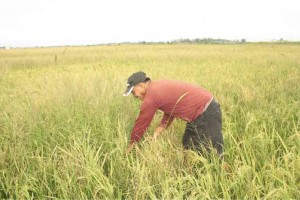Farm workers to Aquino: End hunger in Luisita
CITY OF SAN FERNANDO— Solving persistent hunger among 90 percent of farm workers in Hacienda Luisita in Tarlac province should be the priority of the administration of President Aquino, as 4,099 hectares of his family’s 6,443-ha estate are due to be given away starting September, the Farmworkers Agrarian Reform Movement (FARM) said on Saturday.
Aside from asking Aquino to rally national agencies to tackle food security for the 10 villages inside Luisita, FARM said the President should order the Department of Agrarian Reform (DAR) to stop promoting sugarcane block farming among the 6,212 would-be beneficiaries.
“[We] cannot truly free [ourselves] from poverty unless [we] are free from hunger,” said a statement signed by Renato Lalic and Roger Amurao, president and vice president of FARM in Luisita.
Stock distribution
FARM, assisted by lawyer Christian Monsod, is one of the groups that filed the lawsuit at the Supreme Court to revoke the stocks distribution plan undertaken by the estate in 1989 instead of and distribution.
But the Presidential Agrarian Reform Council ruled in 2005 that Luisita lands must be distributed. Its decision was upheld by the Supreme Court in April 2012.
The President’s grandfather bought the Luisita estate and sugar mill in 1957 using a government loan and guarantee.
Lalic and Amurao said the delay in land distribution was due to the DAR’s “promotion of the continuity of sugarcane production.”
Agrarian Reform Secretary Virgilio de los Reyes, they claimed, showed this bias in an article published in the agency’s newsletter “DyaryoDAR” in March.
De los Reyes denied the bias. “The option is [left to] the farm workers as to the crop, method and mode of organization,” he said, adding that soil tests have been completed.
He said the government would “support and enable [the beneficiaries] but cannot dictate [what they would do with their lands].”
He said a food security program is being prepared in cooperation with the Department of Social Welfare and Development. “The government will lay out options and provide support services,” he said.
Lalic and Amurao called block farming an “unjust imposition that disregards the farm workers’ right to choose what crops to produce and when and how to produce them.”
“It completely disregards the reality that patches of rice lands have been developed inside Hacienda Luisita through the sheer hard work of farm workers in line with their desire to solve hunger through food security in their respective households,” they said.
Lalic said he produced 78 cavans of rice from the 7,000-square meters of land he tilled last year, keeping 18 cavans for food reserve and netting an income of P30,000 from one harvest.
He said this harvest was higher than the P23,000 income from 10-months spent on sugarcane growing.
FARM members have grown palay in 40 has in Barangay Pando and 10 has each in Barangays Mabilog and Parang.
Because the DAR allocated these lots to other farmers, FARM said it would be difficult for its members to start rice planting anew in other plots, so it urged the Department of Agriculture to start experimental farms to determine which crops are suitable in Luisita.
“This bias for sugarcane block farming is the reason the DAR has totally ignored farm workers’ suggestion to assign to actual occupants the rice lands they have already developed. The argument that the tambiolo system is the most transparent and unbiased process of allocating the lots ignores the fact that some farm worker-occupants already made the land productive,” FARM said.
Mortgage
According to the FARM leaders, poverty has forced many of their fellow farm workers to mortgage lands ahead of the awarding of the certificates of land ownership awards (CLOAs), using the lot allotment certificates to advance cash from sugar planters.
The Kilusang Magbubukid ng Pilipinas (KMP) warned that the CLOAs are “mere pieces of paper, stating that the farmers can now start paying for the land for 30 years without assurance that they would own the land.”
Randall Echanis, KMP deputy secretary general, said the Luisita beneficiaries may end up like the 255 farmers in Sariaya, Quezon province, whose CLOAs were canceled and lands ordered returned due to a 1982 zoning ordinance that classified them as industrial, which exempts the areas from agrarian reform.
As of last week, only 600 of 6,212 qualified farm workers in Luisita have signed the two documents needed to generate the CLOA and their registration with the Registry of Deeds in Tarlac. Tonette Orejas, Inquirer Central Luzon















